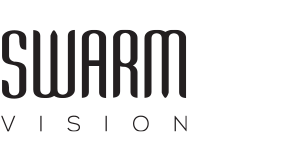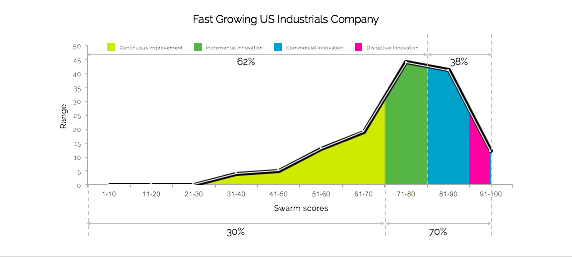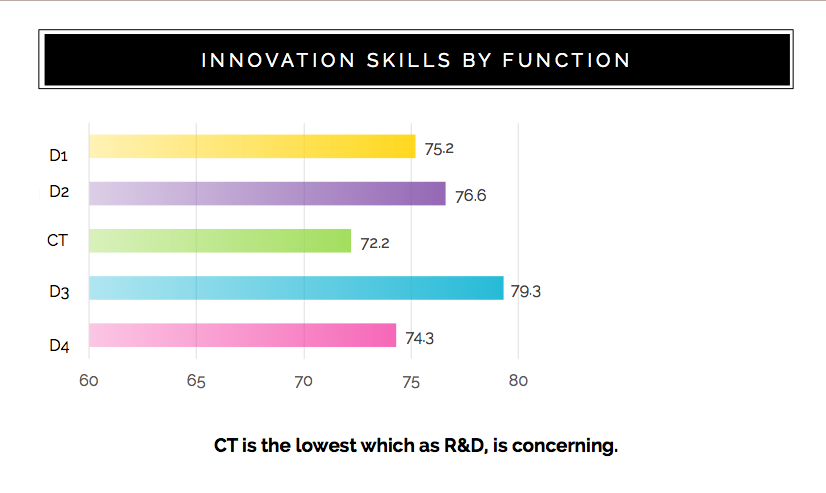Topics: innovation teams, innovation research, Innovation, innovation talent, transformation, recruitment, talent acquisition
Transform your organization for the innovation age
Topics: innovation teams, innovation research, Innovation, innovation talent, transformation, recruitment, corporate innovation, growth, organization transformation, culture of innovation, talent acquisition
This blog was originally published in InnovationManagement.se.
I grew up in Silicon Valley and credit many people here for my fascination with innovators. One early conversation with my Dad still stands out.
Topics: innovation research, Innovation, innovation talent
Innovation: Is Nature or Nurture More Important?
|
|||||||||||||||||||||||||||||||||||||||||||||||||||||||||||||||||||||||||||
Topics: innovation teams, innovation research, Innovation, innovation talent
Coffee with a Futurist (Or, The New Leadership Literacies)
|
|||||||||||||||||||||||||||||||||||||||||||||||||||
Topics: innovation teams, innovation research, Innovation, innovation talent
Five Ways to Drive More Innovation In Your Workforce
One of the reasons Silicon Valley is such an engine of innovation is the open culture here. Thanks to this openness, I was invited to guest blog on the topic of Driving More Innovation in Your Workforce. I invite you read the whole post, and meanwile, enjoy the Five Main Take-aways:
Topics: innovation teams, innovation research, Innovation, innovation talent
This blog was originally published in InnovationManagement.se at on August 15, 2017. In the article, the author shares three surprising observations from analyzing the most popular innovation blogs.
Where is the Best Advice on Innovation Talent?
Innovation is a hot topic today. No wonder that there are numerous blogs on the subject. In a fascinating report, CapGemini found that “difficulty finding the right people to drive innovation efforts was the number one constraint to innovation success:”
Source: CapGemini, Innovation Leader or Laggard, 2010
So we assumed there would be lots of good advice in these blogs on the people side of innovation ‑ innovation talent, leadership and teams. We set out, full of enthusiasm, to find the best blogs on innovation talent.
Our Methodology
The Swarm Vision team set out to identify the best blogs on the subject of innovation talent. How did we do it?
- First we identified the top 60 blogs using several online lists
- We then focused on those blogs with at least 5,000 Facebook fans or Twitter followers, of which there are 31
- We then analyzed recent months of these 31 blogs, looking for any articles on innovation talent
- We also searched key terms on each of 31 blogs to unearth older articles of relevance
- We tagged each article on the aspects of innovation that it discussed (e.g. creativity, leadership, teams, hiring, retention, culture of innovation)
- Finally, we rated each blog on the percentage of articles related to innovation talent, and on the quality of those articles. We defined quality as offering clear advice (not fluff) based on empirical results, not just assertion.
Three Surprising Findings
Based on our research, we reached three unexpected conclusions:
-
Little out there on innovation talent
Our first surprise was that the top 31 innovation blogs offer few articles on the subject of innovation talent. This is particularly surprising given how critical the people side of innovation truly is. -
Casual & vague treatment of innovation talent
Our second surprise was how these mentions were mostly in passing, not dedicated in-depth treatments. The blogs that did mention the topic offered pretty vague advice, such as “You need to hire the right people for innovation,” with little guidance on just how to do that. -
No framework for innovation talent
Thirdly, the subject of innovation talent seems to lack an organizing theory or framework. There are shards of wisdom here and there about creative people, environments that foster creativity, the power of diverse teams, and the like.
Our overall, but unexpected, finding is that the vital subject of innovation talent is not well developed, and that there is a need for a framework for innovation talent, to guide companies on their innovation journeys.
The Drumroll, Please
That being said, three innovation blogs stand out for covering the subject of innovation talent, and for specific articles of value. Consider these blogs your starting point:
| Blog Name | # Facebook Fans | # Twitter Followers |
| Stephen Shapiro Blog | 5,544 | 7,763 |
| Innovation Management | 5,213 | 12,205 |
| Destination Innovation | 112 | 33,640 |
What Do You Want to Learn About Innovation Talent?
We’d like your opinion. Please comment on this blog post, telling us:
- Is innovation talent an important subject for you?
- What specifically, do you struggle with when it comes to the people side of innovation?
- What would you like to read about in an innovation talent blog?
Based on your feedback, we may just dedicate our writing to cracking the meaty subject of innovation talent!
About the Author
Suzan Briganti, CEO & Founder, Swarm Vision
Suzan Briganti brings 25 years of experience in research, strategy and innovation. Suzan has a patent pending in innovation software. She has grown Swarm Vision from a garage start-up to a trusted solution provider to global Fortune 500 clients. Swarm Vision is a platform to identify and leverage innovation talent in the enterprise to drive growth. Suzan leads Swarm Vision with a focus on building great products and teams. Suzan has an MBA summa cum laude from Boston University and a design degree from Italy.
Contact: suzan@swarmvision.com, @swarmvision
Topics: innovation teams, innovation research, Innovation, innovation talent
Are Legacy Approaches to Talent Inhibiting Your Innovation Efforts?
This blog was originally published in InnovationManagement.se at on August 9, 2017. In the article, the author argues that companies need to take a fresh approach to innovation talent in order to realize stronger business results from innovation programs.
What Is The Legacy Approach to Innovation Talent?
The legacy approach to talent selection involves matching education, length of experience and functional skills to the role. All of this makes sense as a baseline, and for well-established professions. But, we argue, selecting talent for innovation requires a whole new approach. Companies must recognize specific innovation skills that drive business outcomes. Yet today, most of us lack the tools to do so.
In an earlier edition of Innovation Management, Prophet warned that legacy thinking, processes, and models toward innovation can anchor new possibilities to yesterday’s standards, which then limits or inhibits the return on innovation. Nowhere is this more true than in innovation talent selection.
The legacy approach to staffing innovation primarily relies on functional expertise. A block chain initiative is staffed with block chain experts. A medical device initiative is staffed with medical device experts. On the surface, that looks eminently reasonable. But here’s the surprising fact: Some of the functions most expected to contribute to innovation may be the least cut out to deliver it. Furthermore, If you line up a sample of any functional knowledge group, you will find they fall on a spectrum of innovation skill.
Innovation Talent Varies Widely in the Workforce
For example, we studied a group of 250 employees in a leading industrial company. Guess what? Core Technology (CT), the function most expected to deliver innovation, scored among the lowest on innovation skill. Yet within Core Technology, individual innovation scores ranged from a low of 45 to a high of 94. This matters when the organization is relying on technology or R&D to deliver innovation.
Defining Innovation Skills
What do we mean by innovation skills? Does it mean candidates need to know Lean Start-Up and Design Thinking? Does it mean they need to code? No. But take heart. The Innovation skills that impact business results are now both known, and can be measured.
How can we be so sure? Back in 2014, we were running large-scale innovation crowdsourcing campaigns for huge companies. We recruited thousands of participants from 90+ countries into crowds for Intel. Procter & Gamble. ABInbev, and more. We noticed that different kinds of people tended to join these crowds.
Some of the crowd were very active reading and commenting on ideas, but didn’t submit many ideas themselves. Some were talented designers but didn’t submit fundamentally very novel ideas. Others submitted a lot of really novel ideas. We wanted to figure out how to identify these prolific and disruptive thinkers. We cracked that code with our crowd innovation profiler, but we still weren’t satisfied. After all, companies need more than just ideation skills.
So we undertook another two years of proprietary research, studying serial innovators, half entrepreneurs and half intrapreneurs, from a wide array of industries. Hypotheses emerged about the skills that make successful innovators different from the general population. And then we conducted three rounds of quantitative research internationally to finalize our instrument.
The Eight Innovation Skills That Drive Business Outcomes
It turns out that eight distinct skills correlate with real world innovation business results, Business results like sustained profits, hyper-growth, top quadrant analyst ratings, loyal customers, acquisition and IPO:
These eight skills are the same, whether you’re in medical devices, consumer packaged goods, or fintech. Moreover, these are not qualities that hiring managers are trained to detect. (Certainly resume parsing bots do not know how to identify them!)
Can We Predict Business Outcomes of Innovation Based on Who Is Involved?
The Holy Grail for us is to be able to not only identify the innovation skills of successful innovators in a rear-view mirror, but to be able to predict business outcomes from innovation, based on who is involved. We hypothesized that high Swarm scores would correlate with better business results. And our hypotheses were validated. People who scored high (in the top quintile) on the Profiler achieved 2-3x as many innovation business results as those in the bottom quartile:
Interestingly, Horizon 3 (Disruptive) innovators not only have higher average Swarm scores, but specific Swarm profiles: They score higher not just on Boundary Breaking and Novelty Seeking which one might expect, but also on Resourcefulness, Initiative and Intensity.
Why Innovation Talent Selection Needs to Change
The field of innovation talent selection is in its infancy. Today companies are still falling back on legacy talent approaches that harken back to the early days of the industrial revolution. Typically, companies select talent for innovation who:
- Are available
- Are known to / liked by the hiring manager
- Have the relevant functional skills
- Appear somehow creative
We will write separately about the perils of confusing Creativity with Innovation. But for now, why is a legacy approach to innovation talent problematic? CapGemini found that difficulty finding the right people to drive innovation efforts was the number one constraint to innovation success:
Source: CapGemini, Innovation Leader or Laggard, 2010
Why Taking A Fresh Approach is Essential
In Why Good Companies Go Bad, HBR found that in failed companies, the fresh thinking that led to a company’s initial success is replaced by a rigid devotion to the status quo. And when changes occur in the company’s markets, the formula that had brought success instead brings failure. Swarm Vision has created a scalable platform to identify and harness innovation talent in the enterprise. Innovation talent is a primary constraint to innovation success. We challenge the reader to examine the way you select talent for innovation, and to tap the new data-driven tools now available in the market.
About the Author
Suzan Briganti, CEO & Founder, Swarm Vision
Suzan Briganti brings 25 years of experience in research, strategy and innovation. Suzan has a patent pending in innovation software. She has grown Swarm Vision from a garage start-up to a trusted solution provider to global Fortune 500 clients. Swarm Vision is a platform to identify and leverage innovation talent in the enterprise to drive growth. Suzan leads Swarm Vision with a focus on building great products and teams. Suzan has an MBA summa cum laude from Boston University and a design degree from Italy.
Contact: suzan@swarmvision.com, @swarmvision
Topics: innovation teams, innovation research, Innovation, innovation talent
Harness the Innovation Talent Already on Your Payroll
Our goal is to help large companies become more supportive of innovative and entre- and intrapreneurial thinking and behaviors. This will make companies more productive, and create happier workplaces. But most importantly, they will become more successful in their innovation endeavors.
Q: How can businesses use the Swarm Enterprise Profiler? What’s in it for them?
A: We hope enterprises use the Profiler to identify and harness the innovation talent already on their payroll. It exists to improve their innovation success rate, and make happier employees
After we created the Swarm Crowd Profiler (https://community.swarmvision.com/), we saw a big opportunity with the enterprise, because many large companies struggle to innovate, and they often turn to their workforces to generate ideas. The problem is, few of their employees were selected for their innovation abilities — they were first in their class on the accounting test, etc. That’s cool for a vertical skill (e.g. accounting) but it doesn’t tell us anything about their innovation potential.
The first step is for large companies to understand the innovation talents they already have, and what skills they may lack. They can then use this understanding to balance teams, set goals, provide feedback to managers, consider innovation potential in their hiring. Placing these people across the entire innovation cycle is key.
Next we are studying the ideal make up innovative teams, across a wide range of industries, and full gamut of innovation targets — from commercial to disruptive innovation. Eventually, we will be able to benchmark companies within their industry, and against global innovation leaders.
Overall, I hope with this insight, large companies can become more supportive of innovative thinking and behaviors. This will make companies more productive, and create happier workplaces. But most importantly, they will become more successful in their innovation endeavors.
If you are interested in using the Swarm Enterprise Profiler in your enterprise, you can request a log in by contacting info@swarmvision.com or sign up for a Free Trial (15 licenses for 15 days....deal!
Topics: innovation teams, innovation research, Innovation, innovation talent
The Swarm Innovation Profiler clearly differentiates innovators from the general population. And our questions not only correlated better with innovators, but with real world business results.
Topics: innovation teams, innovation research, Innovation, innovation talent







